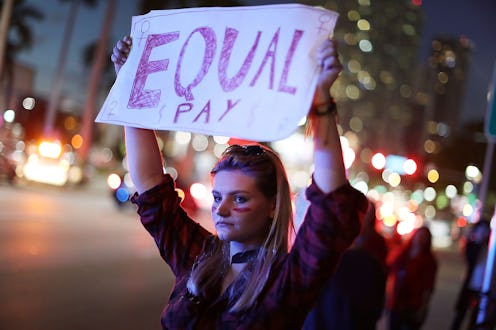News
A House Committee Just Voted To Make The Fight For Equal Pay Harder

With everything going on in the news, it's easy to forget the fight for equal rights that keep on pressing forward, despite many setbacks. Now, just this week, the push for equal pay moved backwards after a House committee voted to approve an amendment that would end an initiative designed to help get rid of unequal wages.
The Obama-era initiative in question would have required companies with more than 100 employees to file pay data with the Equal Employment Opportunity Commission (EEOC) beginning 2018. It was designed to increase transparency and therefore help women gain equal pay. "Sunlight is the best disinfectant, and that's why pay transparency is so important," said Tracy Sturdivant, the co-founder and co-executive director of Make It Work. The EEOC had previously announced that they would begin requiring that information in March of 2018, but the budget amendment currently being considered in the House would prevent that.
Now, as part of their deliberations on appropriations for the Departments of Commerce and Justice, among others, the House Appropriations Committee has voted to approve an amendment would forbid the EEOC from using their funds to collect pay data from employers. Effectively, this means that the EEOC would be unable to bring the transparency initiative into effect, and thus would be unable to support women in their effort to receive equal pay for their work.
As this was merely a vote in the House Appropriations Committee, it doesn't mean that the transparency initiative doesn't still have a chance to become a reality. The appropriations bill still has to pass the House of Representatives, so now it's time to call your congressman and ask them not to allow this amendment into the bill.
However, given the way things have been moving this administration, it seems more likely that the bill will pass with the amendment intact. Trump has already withdrawn some protections for female workers, and his administration is lacking heavily in terms of women in leadership roles. On top of that, the Trump White House has a serious gender pay gap.
According to Reveal, the effort to get the amendment into the appropriations bill was spearheaded by the U.S. Chamber of Commerce and backed by numerous business groups. Their argument was, essentially, that more data collection would merely be an academic exercise and wouldn't lead to any change. Organizations dedicated to making equal pay a reality, however, disagree.
"To challenge discrimination we need to know where it is occurring," wrote sociologist David Tomaskovic-Devey in a letter to the Office of Management and Budget. "This cannot be done without pay and employment data linked to workplaces." Transparency is important, because women are much more likely to challenge their employers over wage discrepancies when they can easily see that it's taking place. So, the fight must continue as this bill moves to the floor of the House — and beyond.